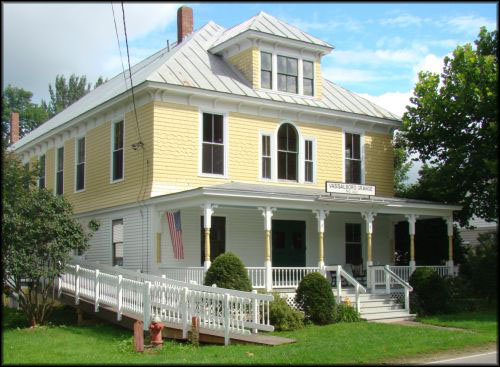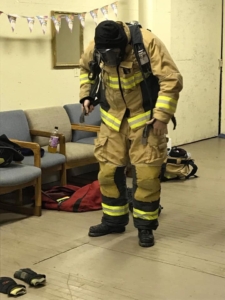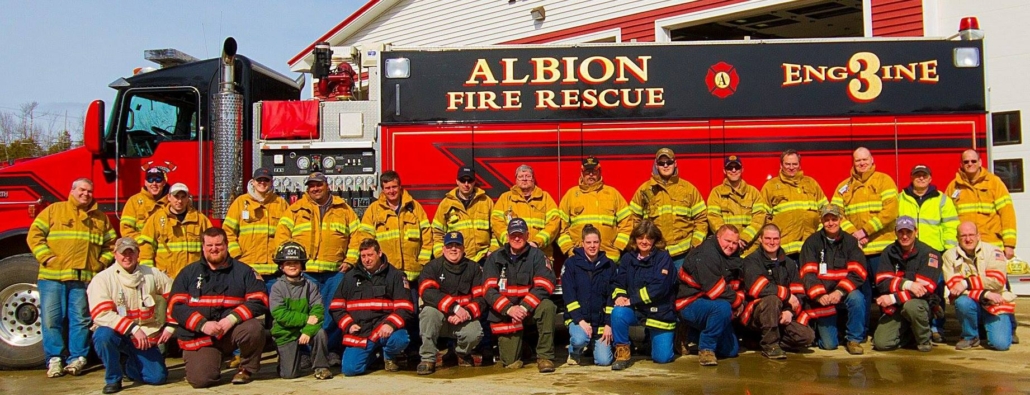CAMPAIGN 2024: Candidates address issues concerning Maine voters (Part 1)
/0 Comments/in Albion, Augusta, Branch Mills, Central ME, China, Clinton, Fairfield, Kennebec County, News, Politics, Sidney, Somerset County, Vassalboro, Voting Guide, Waterville, Weeks Mills, Windsor, Winslow/by Website EditorChina workshop aims to bring area towns together
/0 Comments/in Benton, Central ME, China, Community, Events, Kennebec County, Palermo, Sidney, Vassalboro, Weeks Mills, Windsor/by Eric W. Austin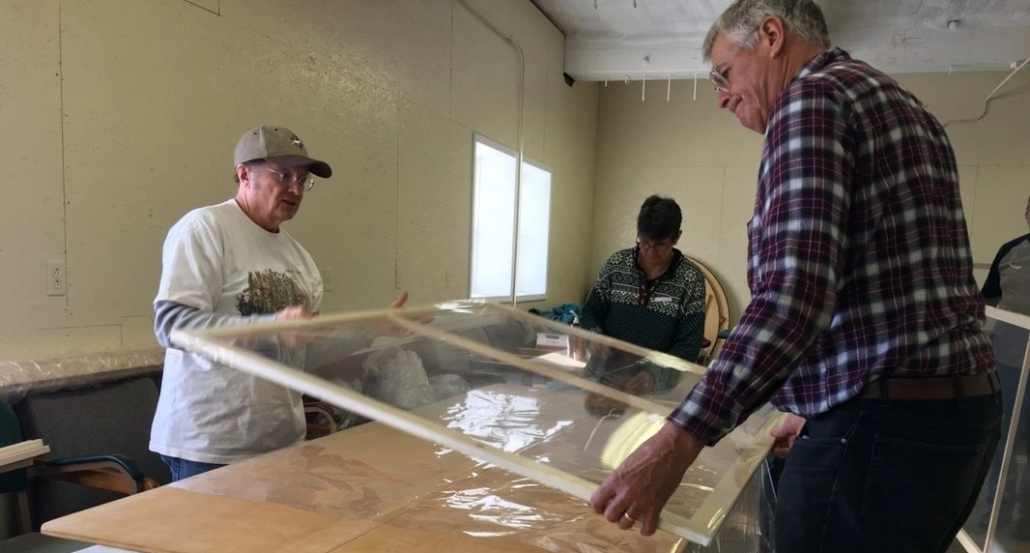
Volunteers prepare window inserts at a previous WindowDressers workshop, in Vassalboro. (photo courtesy of Vassalboro Historical Society)
by Eric W. Austin
CHINA, ME — Planned for the second week in November starting just after Election Day, the China Window Dressers workshop is moving full steam ahead. The intent of the workshop is to build low-cost window inserts to reduce heating expenses for homeowners in central Maine. The organizers have spent the past year taking orders and visiting local homeowners to measure the windows requiring inserts, and now they are looking for volunteers to help at the upcoming workshop.
Sponsored by the China for a Lifetime Committee, a local group dedicated to philanthropic activities meant to improve the quality of life for China residents, and assisted by other local organizations, the initiative is modeled after the classic “barn-raising” community efforts of the past, with residents working together for the benefit of everyone.
Committee chairman Christopher Hahn describes it this way: “The workshop is a great chance for the community to come together and help one another during these tough financial times. Such events don’t happen as often as they should anymore in this age of Facebook and online Zoom meetings, so we jumped at the opportunity to organize this workshop. It fits right in with our mission of ‘neighbors helping neighbors.’ I hope to see many familiar faces and hopefully some new ones.”
The committee has received more than 130 orders for window inserts from over two dozen local clients across central Maine. Although the workshop will take place at the China Conference Center, orders have been open from any of the area towns and volunteers for the upcoming build workshop do not need to have ordered inserts or live in China. The workshop will run from Wednesday, November 9, through Sunday, November 13. Work shifts are divided into a morning shift from 8:30 a.m. – 12:30 p.m., and an afternoon shift from 1 – 5 p.m. Food will be provided by community volunteers between shifts. The first two days are devoted to putting together the wooden frames for the window inserts, while the next two days will be for wrapping those frames in plastic and foam. Sunday will serve as an overflow day if everything cannot be completed by Saturday evening.
No experience is necessary to help out, and there are still plenty of spots that need to be filled. Hahn says they are aiming for eight people per shift. The work is not complicated, and designed to flow through an assembly line process, making it easy for anyone to participate. Participants from earlier workshops will be on hand to answer any questions and provide guidance for volunteers.
For those interested in signing up to participate in the workshop, there are several ways to get involved. The easiest way is to visit the Window Dressers website at windowdressers.org. Click on “Community Builds” link on the menu at the top-right of the page, then scroll down to the China build and click where it says “Sign up to volunteer”. (Click here to go there directly.) That will take you to a page where you can choose which time-slot best fits into your schedule.
If you’re not tech-savvy, or don’t have internet access, you can also send an email to ChinaforaLifetime@gmail.com or call the China town office at 445-2014 and let them know what days you are available to help.
More information about the China for a Lifetime committee can be found on their website at chinaforalifetime.com.
Norman Black is Maine’s only recipient of the STACVA
/0 Comments/in China, Community, Weeks Mills/by Website Editor
China Select Board Chairman Ron Breton, left, presents the Small Town America Civic Volunteer Award to Norman Black, a 30-year veteran of the Weeks Mills Volunteer Fire Department. (photo courtesy of Rebecca Hapgood)
Norman Black of South China is Maine’s only 2021 winner of a national Small Town America Civic Volunteer Award.
Select Board Chairman Ronald Breton presented Black with a certificate at the Jan. 31 select board meeting. Breton said Black, a China native, has been a member of the Weeks Mills volunteer fire department since he was a teenager and a member of China Rescue for 10 years.
The presentation was followed by applause and congratulations from the small audience.
Each year 100 STACVA awards go to people from towns or counties with populations fewer than 25,000, to recognize public service and public safety volunteers.
The STACVA is an annual program that honors 100 extraordinary public service volunteers in localities under 25,000. It spotlights the urgent need for citizens to fill critical civic volunteer roles including local government boards and councils, volunteer firefighters, EMTs, and the many advisory committees that support key local government functions.
Research shows that the percentage of people volunteering in small communities and rural counties has dropped substantially over the last 12 years. Civic volunteerism is the lifeblood of small town and rural America. STACVA is intended to help address this critical shortage by recognizing and supporting “hometown heroes,” and by promoting best practices designed to spur a force of new civic volunteers to fill these vital roles.
China is fortunate Maine’s only recipient resides within its boundaries. The winner is a lifelong resident of China who started volunteering in his teens for the Weeks Mills Fire Department. Over thirty years later, this recipient continues to serve the Weeks Mills Fire Department and has volunteered for the past 10 years for China Rescue as an EMT. The China Select Board is proud to present the Small Town America Civic Volunteer Award to Norman Black. Thank you for your service and dedication to the community.
Up and down the Kennebec Valley: The Grange – Part 1
/3 Comments/in Albion, Central ME, Chelsea, China, Clinton, Fairfield, Local History, Maine History, Weeks Mills, Windsor/by Mary Growby Mary Grow
The mother and father of all United States agricultural organization is the Grange, formally known as the Order of Patrons of Husbandry. The national Grange was organized in Washington, D. C., on Dec. 2, 1867, by a seven-person group headed by Oliver Hudson Kelley (1826 – 1913), a Bostonian who moved to Minnesota in 1849 to become a farmer.
A Grange historian quoted in Ruby Crosby Wiggin’s Albion history wrote that the organization was a response to the “depressed condition” of agriculture after the Civil War. The 1873 financial panic hastened its growth.
In 1864, Kelley, working for the national Bureau of Agriculture, inspected post-war farming conditions in the southern states. He realized the need to help farmers earn their living from their land, found like-minded friends and created the Grange.
Kelley intended the organization as “an agricultural fraternal order,” not unlike Masonry, with rituals, named offices, degrees and an aura of secrecy, Maine Grange historian Stanley R. Howe wrote in a 2010 article reproduced on line.
“Fraternal” was never accurate, however; Howe credited Kelley’s niece, feminist Caroline A. Hall, with gaining women near-equality in the Grange. They had voting rights from the beginning and four of the 16 elected offices in each Grange are exclusively for women.
(Online information says in 1893 the Minnesota Grange elected a woman named Sarah Baird as the first female state Grange President [Master] in the United States. Minnesota’s current state Grange president is a woman, and so is the president of the national Grange, for the first time: Betsy Huber, of Pennsylvania, a Granger since she joined a Junior Grange at age five, has been national president since 2015.)
The name Grange comes from Great Britain, where the part of an estate used for agriculture was called the grange, Howe explained.
As the organization developed and spread, four main purposes emerged.
Economic improvement remained central. Means included cooperative stores, where the organization bought in bulk and sold to members at cost; discounts on things like life and health insurance; and spreading information about improved agricultural techniques, new machinery or seeds and other benefits to farmers.
Education, agricultural and general, was important. Granges published reports, newspapers and bulletins; many Grange halls had libraries; most Granges sponsored educational presentations on topics important to local farmers and the community; many hosted classes and workshops.
Having an organization that operated locally, state-wide and nationally gave Grangers political clout. One of the first national efforts was to pressure Congress to lower railroads’ shipping rates so that farm products could be sent to market more cheaply. Grangers also wanted grain elevators’ charges controlled.
The Grange lobbied for the postal service’s Rural Free Delivery system, so that isolated farmers would not have to choose between driving miles to the post office or paying a commercial carrier to pick up their mail. Grangers supported a variety of national cooperative farmers’ institutions; one source says they were instrumental in making the head of the United States Department of Agriculture a member of the President’s Cabinet in 1889.
Grange members lobbied for the Prohibition movement (implemented by the 18th Amendment to the United States Constitution, in effect Jan. 16, 1919, and repealed by the 21st Amendment, in effect Dec. 5, 1933). They helped implement progressive political ideas, like direct election of Senators (the 17th Amendment, in effect April 8, 1913) and voting rights for women (the 19th Amendment, in effect Aug. 18, 1920). Current national President Huber advocates expanding access to broadband service, especially in rural areas.
Complementing these economic, educational and political goals, at the local level the Grange became the social center for rural towns across the country, providing a community meeting hall and sponsoring suppers, dances and local and imported entertainments. One historian called this function especially important to rural women, who were more isolated than the men.
The Maine State Grange was organized in Lewiston on April 21, 1874, a year after the first Grange in the state was established in Hampden. Grange and state websites say there were 64 Maine Granges with about 2,000 members by the end of 1874; within two years, 228 Granges and 12,000 members; in 1907, 419 Granges and more than 55,000 members; and in 1918, 450 Granges and 60,000 members. Membership peaked at around 62,000 in the 1950s and has declined in recent years.
In 1918, according to that year’s Maine Register, W. J. Thompson, of South China, was Master of the state Grange. His wife held the position of Flora (one of three ritual stations, with Ceres and Pomona, Howe explained) and D. E. Foster, of Augusta, was Steward.
(Wikipedia says Ceres was “the Roman goddess of agriculture”; Flora was “the Roman goddess of flowers” and of spring; and Pomona was “the Roman goddess of fruit and nut trees.”)
Political positions the Maine State Grange took included supporting funding for local schools and the University of Maine and opposing the repeated efforts to move the state capital from Augusta. Augusta’s Maine Farmer newspaper, published from 1823 to at least 1900 (see The Town Line, Nov. 26, 2020), was a Grange publication.
The organization promoted causes that benefited not only farmers, but other segments of society. Howe mentioned sending care packages to soldiers overseas during World War II and building and supporting Grange Cottage to house orphans at Goodwill-Hinckley School, in Fairfield.
Since 1945, the Maine State Grange has been headquartered on State Street, in Augusta.
In the 1880s the state organization added county Granges, called Pomonas. Juvenile Granges started in 1944; Palermo’s Sheepscot Lake Juvenile Grange #106 and Augusta’s Capital Junior Grange #274 were active in the 1950s and 1960s.
A current on-line list from the Maine State Grange says there are 103 active Granges in Maine, counting both local and county Granges. Local ones listed are Benton Grange, Fairfield Center’s Victor Grange and Branch Mills Grange, in Palermo; Vassalboro Grange, in East Vassalboro, should also be on the list, according to its Facebook page.
Albion Grange #181 was one of the earlier local Granges, past and present. Maine State Grange Master Nelson Ham oversaw its organizational meeting on July 6, 1875, historian Ruby Crosby Wiggin wrote. There were 36 charter members: 34 couples, the son of one couple and an unmarried woman.
Wiggin said in 1875, only farmers and their families were eligible to join the Grange. Doctors, storekeepers and all other non-farmers were excluded.
In 1873, Albion residents had organized a local stock company to build a community hall. The hall was finished in 1874, and the first Grange meeting was held there.
Until January 1881 Grangers rented the hall only for meetings. In January 1881, the Stock Company leased it to the Grange at $35 a year, and in 1886 the Grange bought the building.
Beginning in October 1875 Grangers ran a cooperative store, buying a variety of items – coffee, salted fish, cloth, raisins, rock salt, cheese, sugar, chewing tobacco, grass seed – in bulk and selling them to members. Meetings included panel discussions, suppers and other forms of entertainment.
On Oct. 4, 1879, Albion Grange held its first fair, in conjunction with Freedom Grange. Independent Albion Grange fairs were held annually into the early 1950s, Wiggin wrote.
By 1892, Henry Kingsbury wrote in his Kennebec County history, Albion Grange had 150 members. In 1902, the Maine State Grange Proceedings says there were 252 members.
In 1903 Grangers added a dining room to their building, which they still used when Wiggin published her Albion history in 1964. On-line sources suggest the Grange had been re-established in 1957, probably after an interval of inactivity.
In Augusta, records show two Granges. The earlier, Capital Grange #248, was organized April 7, 1883, according to Capt. Charles E. Nash’s chapter on Augusta in Kingsbury’s history. The second Capital Grange Master was Samuel L. Boardman, who wrote the chapter on agriculture in the same book.
On Nov. 12, 1901, according to records of the national Grange, Brother Obadiah Gardner carried an invitation to those attending the national convention to visit Augusta on Nov. 19, traveling by train. The flowery letter was signed by Capital Grange Master G. M. Twitchell and Augusta Board of Trade President C. B. Burleigh.
Attractions included touring the city and the State House; meeting Governor Hill and his wife at “the mansion of the late Hon. J. G. Blaine, which remains as it was when he did his great work”; and visiting “the national home at Togus,” then caring for 2,600 Civil War veterans.
The Grange records say that Brother W. K. Thompson, of South Carolina, moved to accept the invitation. Discussion was postponed from the morning to the afternoon session, when Brother Thompson’s motion was “considered at considerable length and unanimously adopted.”
(Obadiah Gardner [1852-1938], a Michigan native who moved to Maine in 1864, graduated from Coburn Classical Institute, in Waterville, and farmed in the Rockland area, was Master of the Maine Grange from 1897 to 1907. He ran unsuccessfully for governor in 1908; was appointed to the United States Senate in September 1911, after William P. Frye died in office; and lost his re-election bid in 1912, leaving the Senate March 3, 1913. He was then appointed to the International Joint Commission to deal with boundary-water issues between the United States and Canada, on which he served until 1923.)
In 1902, M. F. Norcross, the Deputy of West Kennebec County, reported on his Nov. 21 visit to Capital Grange, which then had 60 members. He found there were “[n]ew rituals and badges,” and the members were much interested in “working the third and fourth degrees” under a capable Master. “Bound to succeed,” he summarized.
Later references to Capital Grange are hard to find. The on-line index to the University of Maine’s Raymond L. Fogler special collections library says the library has 110 years of Capital Grange treasurers’ records, from 1883 to 1993.
Capital Junior Grange seems to have been created in or before 1955 and to have lasted until at least 1961.
North Augusta Grange #348 was founded in or before 1899 and existed until at least 1973. In the 1902 Proceedings of the Maine State Grange, Norcross, reporting as Deputy for Kennebec County, said North Augusta Grange had 126 members and a Degree Team and appeared to be doing well.
Nineteen pages later in the same book, Norcross, listing himself as Deputy for West Kennebec County, reported on his Nov. 4 visit to the North Augusta Grange. The Master told him meetings had been suspended temporarily “on account of a drama.” Norcross gave no details, but commented, “It is hoped that the work that the Grange is designed to do is not made a secondary matter.”
19 Granges in the central Kennebec River valley, in the order in which they were founded (as nearly as this writer can determine)
Victor Grange #49, Fairfield Center; established 1874, still active.
Oak Grove Grange #167, North Vassalboro; May 11, 1875.
Albion Grange #181; July 6, 1875.
Albion Grange #181, Oct. 28, 1957; suspended Aug. 26, 1998, for failure to file state corporate reports (according to an on-line source).
Sidney Grange #194; November 24, 1875.
Cushnoc Grange #204, Riverside (Vassalboro); January 13, 1876.
Capital Grange #248, Augusta; Apr. 7, 1883.
Windsor Grange #284; June 2, 1886.
China Grange #295, South China; December 29, 1887.
Clinton Grange #287; March 1888 (according to Kingsbury; this date is out of sequence).
Clinton Grange #287, July 15, 1949; dissolved Sept. 6, 2006, for failure to file state corporate reports (according to an on-line source).
Winslow Grange #320; in existence by 1894.
East Vassalboro Grange #322, 1895; still active.
Silver Lake Grange #327, China Village; 1895 or 1896.
Branch Mills Grange #336, Jan. 1, 1897 (organized in China, most of its life in Palermo); still active.
North Augusta Grange #348, in existence by 1899.
Sheepscot Lake Grange #445, in existence by 1905.
Benton Grange #458, 1906; still active.
China Lake Grange #578, also called China Grange; fall 1974-1976?, China Village.
19 Granges in the central Kennebec River valley, alphabetical by municipality
Albion (two) Albion Grange #181, 1875; Albion Grange #181, 1957.
Augusta (two) Capital Grange #248; North Augusta Grange #348.
Benton Grange #458.
China (three) China Grange #295; Silver Lake Grange #327; China (Lake) Grange #578.
Clinton (two) Clinton Grange #287, 1888; Clinton Grange #287, 1949.
Fairfield Center Victor Grange #49.
Palermo (two) Branch Mills Grange #336; Sheepscot Lake Grange #445.
Sidney Grange #194.
Vassalboro (three) Oak Grove Grange #167; Cushnoc Grange #204; East Vassalboro Grange #322.
Waterville had none, apparently.
Windsor Grange #284.
Winslow Grange #320.
Main sources
Kingsbury, Henry D., ed., Illustrated History of Kennebec County Maine 1625-1892 (1892).
Wiggin, Ruby Crosby, Albion on the Narrow Gauge (1964).
Websites, miscellaneous.
An inside look at local volunteer fire departments
/0 Comments/in Albion, China, Community, News, Vassalboro, Weeks Mills/by Eric W. Austin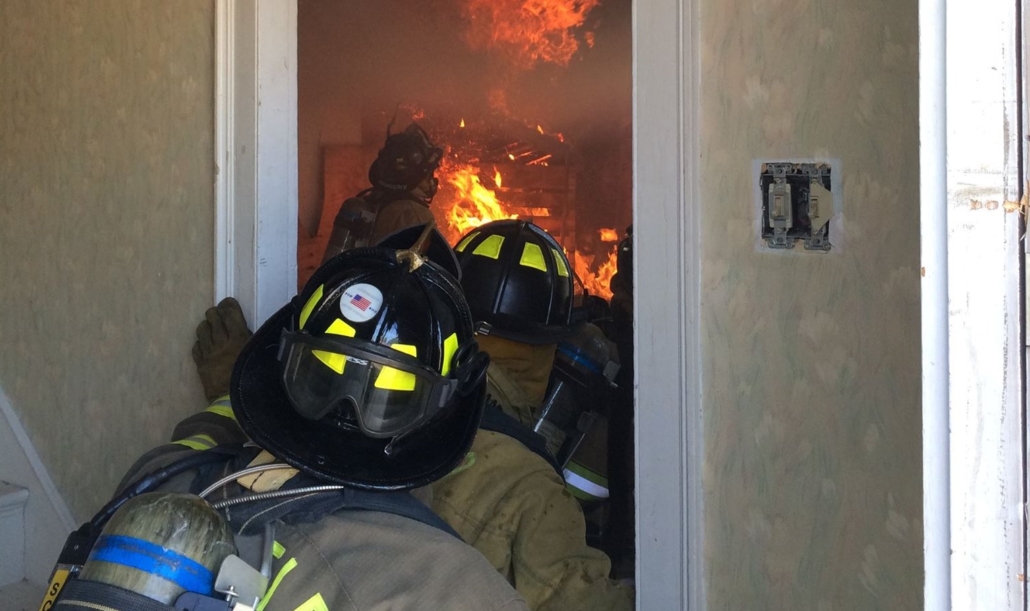
Firefighters participate in a “live burn” training exercise in Albion. (photo courtesy of Albion Fire & Rescue)
by Eric W. Austin
In the decades since, 1947 has become known as “the year Maine burned.” More than 200 fires raged across the state in the fall of that year, destroying over a thousand homes and seasonal cabins, burning a quarter of a million acres, and utterly devastating nine Maine towns. Thousands of Mainers went homeless. Sixteen people were killed. Maine’s governor, Horace Hildreth, called for a state of emergency. President Harry Truman mobilized the U.S. Army and Navy to help fight the fires and evacuate citizens.
Portents of the coming catastrophe came as early as March of that year. After a long and weary winter, the citizens of Maine were greeted by spring rains that, once they arrived, refused to let up until well into June. This was followed by one of the driest summers on record. Autumn arrived and still the rains held off. By October, all of Maine was a tinderbox just waiting for the spark.
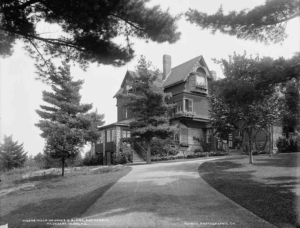
This “cottage,” owned by James G. Blaine, was one of those located along Millionaire’s Row in Bar Harbor, and destroyed in the 1947 fires. (photo courtesy Library of Congress)
Worst hit were York County and Mount Desert Island. The fires swept through Bar Harbor and obliterated the famous Millionaires’ Row, leveled half of Acadia National Park, and forced the evacuation of the island’s residents by sea.
Finally, on October 29, 1947, the rains came, and the fires across the state were at last brought under control. In the wreckage of gutted homes and flattened forests, the people of Maine began to think about how to prepare for the next fiery holocaust.
At the time of the ’47 fires, many of the smaller towns in Maine had no formally organized fire departments, and for those that did exist, there was no system in place for communication and cooperation in case of statewide fire emergencies. That all changed in 1947. Many of our local departments were established at this time, including South China and Albion, both in 1947, and two years later, Windsor, in 1949. China Village and Vassalboro boast a slightly earlier history, in 1942 and 1935 respectively.
This article about the current state of our local volunteer fire departments is based on interviews with seven area fire chiefs, from Albion, China, South China, Weeks Mills, Palermo, Vassalboro and Windsor. Research was also conducted using the internet, newspaper archives, and the exhaustively researched book by Joyce Butler, Wildfire Loose: The Week Maine Burned, available from the Albert Church Brown Memorial Library, in China Village.
Much has changed since the ’47 fires, and our local volunteer fire departments are facing some of the biggest challenges in their 70-plus year histories. With Climate Change bringing warmer weather, drier conditions and more extreme weather events, our volunteer fire departments are more important than ever before.
The number one issue on the minds of local fire chiefs is volunteer recruitment and retention. “It’s a national crisis,” says China Village Fire Chief Tim Theriault. “I’ve been on the fire commission for the State of Maine for five years, and this has been the number one topic. [Statewide], we had 12,000 volunteer firefighters a few years ago. We have 7,000 now. How do we fix this? There’s no silver bullet.”
The struggle to recruit and retain members of our local volunteer fire departments is part of a broader issue involving a lack of civic engagement affecting many organizations, including the Lions Club, the Masons and the American Legion. Volunteer groups like Fire and Rescue have been especially hard-hit by the drop in civic engagement, although it’s also apparent in other areas, such as the number of people running for local office.
“We had an opening [for selectman] last election, in March, and just one person ran,” Albion Fire and Rescue Chief Andy Clark says. “I think people are less likely to volunteer for their community than they used to.”
This decline in the enthusiasm of people to engage in their communities seems to be the result of a number of factors. One frequent complaint is that people are so busy today, often with both parents working just to make ends meet, and this leaves less time for involvement in community organizations.
The internet too has contributed to a drop in community engagement. People are finding their sense of community in online groups, which are usually based on common interests or ideologies, rather than common geography, and local organizations are suffering as a result.
Over the years, our communities have also shifted from rural towns, where people often worked near their homes, on farms or in local factories, to bedroom communities where people work quite a distance from their places of residence. This has had a significant impact on our volunteer fire departments’ ability to respond to daytime fires, especially during the week.
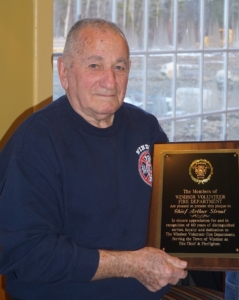
Windsor Fire Chief Arthur Strout, 79, receiving a recognition award for 60 years of service in April 2019. (photo by Eric Austin)
“Our daytime coverage isn’t getting any better,” says Albion’s chief, Andy Clark.
Windsor fire chief, Arthur Strout, relies heavily on several retired members of the department to deal with daytime fires. “There’s about four of us,” he says. “We call it the ‘senior group.’” Chief Strout, at 79, is one of them.
Training is another area that often serves as a barrier to those who might volunteer. Over the decades, training requirements have sharply increased, demanding a level of commitment that often surprises new recruits. Achieving Fireman 1 and 2 certifications can take upwards of 100 hours of classroom time, in addition to practical training involving live burns.
“The problem is,” says Vassalboro Deputy Chief Walker Thompson, “when you tell them they’ve got to go up to the fire school every other weekend, both Saturday and Sunday, [for four months], they might start it, but then they’ll drop out. They don’t realize how much bookwork is behind it.”
“The actual requirements from the Department of Labor haven’t really increased much over the last few years,” comments Albion’s Andy Clark, “but they’ve been more strict about making sure you do it.” However, he adds, “The training that you really need to obtain to do the job is increased, because there’s a lot more to it now.”
Many of our volunteer fire departments offer classroom training at the local station to make it easier for recruits to attend. “Every Monday night,” says Weeks Mills fire chief, Bill Van Wickler, who offers the training to new recruits from China and Palermo. “[We] started in October. We’ll finish sometime in June.” The study book they use is over a thousand pages and as thick as a brick. “All of what’s required is a lot of paperwork,” he says. “There’s just a lot to it to stay compliant. We all work hard at it. It’s time consuming.”
Like training, safety regulations have become more stringent over time. This can be a heavy burden for small departments staffed by volunteers, especially since state and federal agencies hold volunteer departments to the same standards as the bigger, fulltime fire departments. “That just strangles us out here,” says Palermo’s fire chief, Joshua Webb, who is also a fulltime firefighter for Gardiner.
As safety requirements pile on, the cost of equipment also increases. “If it says ‘rescue’ on it, you can double the price,” Webb says. To outfit a new recruit, including coat, hat, pants, gloves and boots, it can set a department back more than $6,000.
“I remember when I first joined the department, we didn’t have any coats,” says Windsor’s chief, Arthur Strout. “The only thing we had was boots. We had to buy our boots, and back then they were fifty bucks.” Today, those boots cost $400.
Air masks, commonly referred to as SCBAs (self-contained breathing apparatus), are another bit of equipment – and expense – that departments didn’t have to worry about 50 years ago. They sell for about $1,500 apiece. It’s another expense, requires additional training, and are mandatory for any firefighter attempting to enter a structure on fire. Further, state law insists that at least four SCBA-certified firefighters must be available before anyone can head into a burning building: two to go into the blaze, while two others stand by as backup in case something goes wrong. For a small department, like Palermo with six active members but only two SCBA-certified firefighters, that’s a high bar. Luckily, strong mutual aid agreements between communities mean these gaps are often filled by firefighters from other departments who respond to the call.
“You can depend on it more than you could back 20 years ago,” says Windsor fire chief, Arthur Strout. “Twenty years ago you were more or less on your own.”
This spirit of cooperation, first sparked in the aftermath of the ’47 fires between the affected New England states and the federal government, has blossomed on the local level in recent years as a response to staffing challenges. “These towns would be hurting if we didn’t have mutual aid,” Strout says. “Other towns depend on us like we depend on them.”
It’s these agreements that have allowed departments to maintain the same reliable coverage even as they struggle to retain volunteers and the towns they serve continue to grow in population.
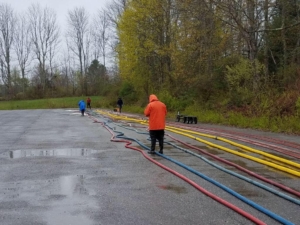
Windsor firefighters testing water hoses for leaks and weak spots, as required by state regulations for safety. (photo courtesy of Windsor Volunteer Fire Department.)
Perhaps the biggest – but least obvious – danger to local departments is volunteer morale. Firefighting is a major commitment. Not only are firefighters risking life and limb to keep their communities safe, they are also sacrificing time with family and friends to spend many boring hours training in order to stay compliant with increasingly stringent state and federal regulations. It’s a lot to ask from anybody, but even more so from unpaid volunteers.
Disagreements between departments and the municipalities in which they operate can be disastrous. Earlier this year, such a disagreement in the town of Thorndike led to the resignation of 28 members of the department.
As Dick Morse, fire chief for South China, says, leading an organization of volunteers is different than being the manager of paid employees. People don’t volunteer to be firefighters for the money. They do it because they want to be part of something bigger than themselves. Destroy that fragile foundation, and the whole structure collapses.
“The only way you’re going to get people to continue to volunteer,” says Weeks Mills Chief Bill Van Wickler, “is if they feel good about it – if it makes them feel good – for their contribution.”
Fortunately, in most cases, fire departments enjoy warm support from their municipal governments, although that relationship is unique for each town. While Albion and Palermo maintain a separate firemen’s association, they think of themselves as essentially a part of their municipalities. Other departments, however, remain fiercely independent.
In recent years, to encourage participation and attract new recruits, most departments have instituted a policy of paying volunteers stipends. Palermo is the lone exception to this, although Chief Webb says a stipend policy has been approved by the town select board and will be implemented soon.
Stipends tend to run in the range of $10-$15 per call for rank and file volunteers, with some departments paying a per hour amount specifically for structure fires. “You’re [basically] paying for gas,” says Dennis Strout, a member of the Windsor fire department.
Officers and chiefs receive more, on account of the administrative overhead they have to deal with, but that hardly covers the amount of work the job requires. Bill Van Wickler, in his second year as chief for the Weeks Mills fire department, admits, “There’s an awful lot more to this than I realized when I thought it would be a good thing to do. I’m not saying I wouldn’t have done it; I’m just saying it was an eye-opener. I had no idea how much work being the chief would be.”
The challenge to find new recruits for local volunteer fire departments is also being addressed on the state level. A measure, the Length of Service Award Program (LOSAP), which would set up a pension fund for Maine’s volunteer firefighters, was passed by the Maine legislature and signed into law by Gov. Paul LePage several years ago, but has since failed to be appropriated any funding. A new bill to fund the program, called “An Act to Attract and Retain Firefighters,” co-sponsored by State Representative and China Village Fire Chief Tim Theriault, was recently passed unanimously out of committee. Although it was set to be voted on by the full legislature during budget negotiations in June, it has now been delayed until next year. Despite these setbacks, Theriault remains optimistic the measure will be funded in the next legislative session.
The fires firefighters are fighting have changed as well, becoming more dangerous to the men and women on the frontlines. Fifty years ago, homes were made primarily of natural materials: wood, steel, and organic products like horse hair for stuffing and insulation. Today, those materials have been replaced with vinyl siding, petroleum-based foam or plastic, and fiberglass. “They burn faster and give off more toxic fumes,” says Vassalboro Fire Chief Eric Rowe. Ironically, the fire retardant used on many products produces deadly smoke when it does burn, making air masks a necessity for anyone venturing into a burning building. “You get it on your coat and your gear,” Rowe says. “That’s how firefighters get cancer.”
“Building construction is a lot more dangerous today,” confirms Albion fire chief, Andy Clark. “You have hazardous materials, you know, and meth labs. There’s just a lot more [to worry about] than there ever was when I started [in 1993].”
Further, the toxic, dangerous nature of today’s house fires requires departments to maintain two sets of gear for each firefighter. One set needs to be ready to go while the other is being cleaned of poisonous chemicals. This requirement doubles the cost of outfitting new recruits, and because most of this gear needs to be custom-fitted for each volunteer, if a recruit quits, there’s no guarantee the gear you just purchased will fit the next one.
Yet, despite all these challenges facing our volunteer fire departments, the news is not all bad. This past year, China, Windsor, and Albion departments have all seen the highest number of new recruits in years, and Palermo is rebuilding its department after half a decade of decline. Fundraising efforts are up for almost everyone, and inter-town departmental ties are stronger than at any time in the past.
But what’s most important to local volunteer fire departments is having the support of the communities they protect, and recognition for the vital role they serve.
“On the worst day of the year, [when] there’s a storm, and everybody’s hunkered down in their homes, and a house catches on fire, or the wires go down, trees go down across the roads – they call me. They call my guys,” says China Village Fire Chief Tim Theriault. “If it’s ten below zero, we’re gonna be there, fighting that fire.”
Eric W. Austin writes about technology and community issues. He can be reached by email at ericwaustin@gmail.com.
COMMUNITY COMMENTARY: An open letter to China residents from the town’s fire chiefs
/0 Comments/in China, Community, Community Commentary, Weeks Mills/by Website Editor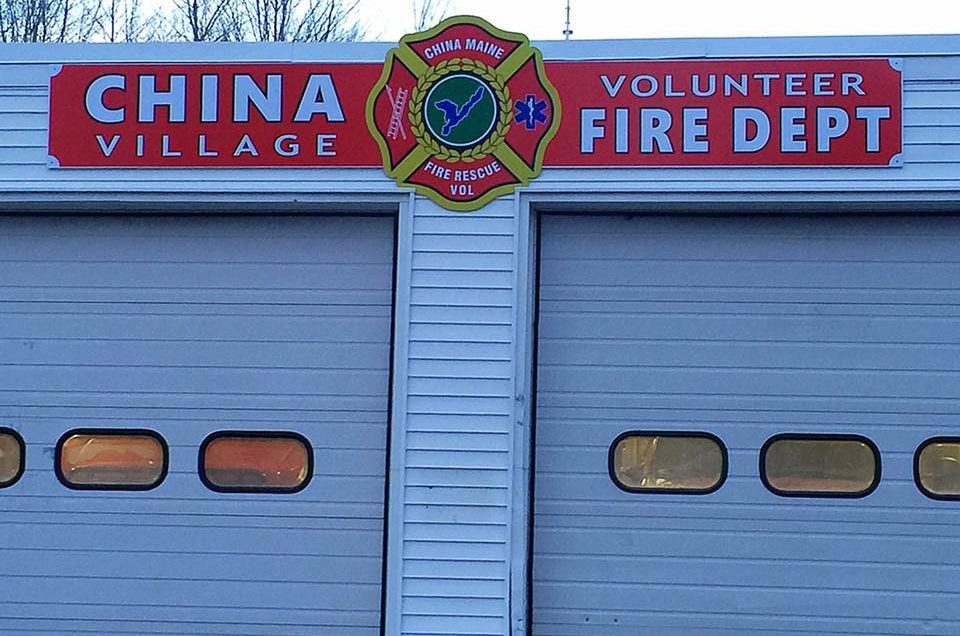 Tim Theriault, Chief, China Village FD
Tim Theriault, Chief, China Village FD
Richard E. Morse, Chief, So. China FD
William Van Wickler, Chief, Weeks Mills FD
To the residents of the town of China, ME, from the volunteer fire departments.
First and foremost we thank you for your annual support both in the money allocated in our budgets, the stipend funds you have approved, and donations during our various fundraising efforts.
It is the collective opinion of the three volunteer fire departments that there are issues with the present selectboard that need to be addressed.
Recent events have brought to light, what in our opinion, appears an effort to control and dictate to the fire departments how to do business. In a recent “Special Meeting,” as it was titled on the town’s website, there was considerable discussion about the fire departments and action taken to reduce the stipend amount to be provided for firefighters in the proposed 2019/2020 budget. This move was done in one afternoon. A midday request was given to the town manager by the selectboard, he in turn provided an alternate to the existing system in place. That evening it was presented, a motion made to use the alternative, and approved unanimously by all members present. This was accomplished in less than one day. There was no discussion held or notice given to any of the fire departments. The only way we became aware of the matter was an after the fact email from the town manager, stating the selectboard approved an alternate to the stipends and the details of how it will work. This recommendation to cut the stipend of firefighters was proposed, ironically, as the selectboard has proposed to increase their own stipend.
In that same meeting, a selectboard member made the statement that a fire department has had the same budget figure for several years (this was proven to be incorrect at the next budget committee meeting). However, this brings to light the same pattern of distrust. This assumption was stated without any communication, not once did anyone reach out to that chief for clarification or an explanation, not to mention the past budgets were available for review had anyone bothered to check.
Here are some things to consider:
- In the Town of China, the Volunteer Fire Departments (VFDs) are independent State of Maine, nonprofit Corporations registered in good standing with the Secretary of State. This form of Fire protection is specifically allowed and provided for in Maine law. This law also allows the Town to support such VFDs with funding in order to provide the emergency services they are required to provide as a Town. VFDs consider these funds to be their operations funds, and they are used to support emergency services that they provide to the Town. The VFDs are not Municipal Fire Departments, and are not under the control and supervision of the Selectboard (Board). They are independent and they have been specifically acknowledged as such in two successive Memorandums of Understanding (MOU) agreed to by the Board and the Chiefs of the VFDs.
- The Board has indicated that they want to know how many fundraising dollars each VFD has so that they can reduce VFD operations budget allocations accordingly.
- It is not appropriate for VFD fundraising dollars be a revenue stream for the town. The funds raised do directly impact town services in the support of firefighting activities and materials. Raised funds are not projected revenue, but are instead additional efforts of volunteers to provide better services to their community. Unless there were some pattern of abuse of these funds, or complaints from the membership in regards to them, there is not a reasonable reason to request this information.
- The Board does have a right to see our books in reference to Town-provided tax dollars. We totally agree with that and currently provide the town with detailed quarterly financial reports showing how we spend Town provided funds.
- The fruits of these private donations as well as fundraising efforts directly pay for or provide matching grant funds for the VFDs to purchase fire trucks, build fire stations, support and reward membership, and for other costs consistent with our status as independent corporations.
- Two years ago, by the request of a former board member, an article was placed in the Town warrant asking the town to appropriate $40,000 for stipends for the VFDs and China Rescue. This was done as a good faith effort though not fully vetted. In spite of the VFD Chiefs speaking against the proposal on the grounds that we had not been consulted and that the proposal had not been fully thought through. Thankfully (in retrospect), the Townspeople voted overwhelmingly in support of it. The first year of the proforma (July 1, 2017), the Board and the VFDs signed an MOU which in addition to recognizing the independence of the VFDs, set up a process for providing the stipends to the VFDs. It called for certain amounts for Chiefs and other officers and for other amounts to reward participation by all members including the officers. The money was to be held by the Town and given to the VFDs on the basis of invoices presented to the Town. The Town would then cut a check to the VFDs and they would pay out the stipends based on the fixed amounts and participation. Financial reporting was required.
- In spite of our initial opposition to the stipend program, the VFDs now recognize and appreciate that it has become a positive factor and has met its intended goal of increased recruitment, retention and participation.
- It is ironic that what was once proposed by the board and opposed by the VFDs has turned completely around and for some reason unknown to us (because they no not consult us) the Board now seems to be in opposition to it as evidenced by their criticism and cuts to the stipend budget and the way it is managed.
China’s firefighters have a history of long-term commitment to the town. Some members serve as much as 50 years in one capacity or another. That type of dedication deserves to be commended, not shunned, at the very least a chance to participate in the decision-making process.
Additionally, there have been comments made by some selectmen stating we need to have only one department and a centralized fire station, again no discussion with the department heads as to why. This will not best serve the town. The geographic location of the existing stations works well and all departments respond seamlessly. It is our opinion that what we have now works well and effectively, so we are at a loss as to why so much effort has been given to fixing something that is, in our opinion, not broken.
Here are our questions: Do they have problems with the way we prevent, manage and control emergencies in this town? Do they think we are not doing our jobs? Do they question our motives? Do they think they can run the VFDs better than the current Chiefs? Do they think they have the knowledge, training and experience to do so? Do they think that change to a municipal, paid fire department would be better? If so, in what ways? Do they have personal problems with any of the Chiefs or members?
One thing we do know. The current situation is not sustainable and should not continue. Beyond the obvious need for communication, we feel the solution is to trust us with what we’re trained to do, take comfort that we know what we are doing, and let us continue the excellent emergency services we have provided to China since 1947.
We hope this information sheds some light on our situation and we hope to hear from you at the public hearings for the proposed budget and the town meeting.
P.S. For more information about how the selectboard and budget committee conduct their business, we recommend that you visit the Town’s website and look at the live stream of their recent meetings.
Read the Selectboard’s response here.
New pastor to be welcomed in Weeks Mills
/0 Comments/in Community, Weeks Mills/by Website Editor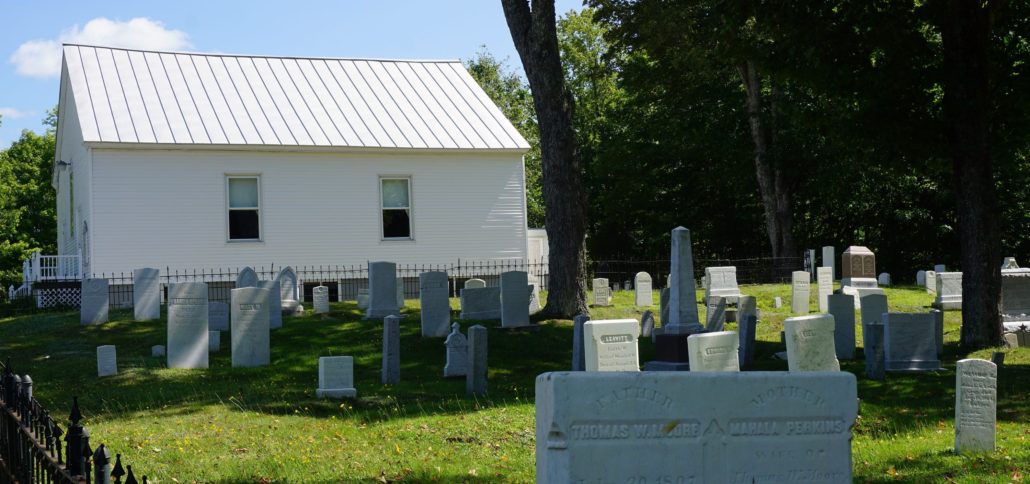
Weeks Mills Baptist Church
The Weeks Mills Baptist Church has appointed Nathan Bell as the new interim pastor. A meet and greet brunch is planned for Sunday, February 18, to welcome Mr. Bell and his wife Elizabeth, who reside in Unity.
The morning church service begins at 9:30 a.m. The church body extends an invitation to everyone to attend the service and the meet and greet brunch that will immediately follow the service.
Area students earn dean’s list at University of Maine
/0 Comments/in Chelsea, Clinton, Fairfield, Liberty, News, Oakland, Skowhegan, South China, Waterville, Weeks Mills, Windsor, Winslow/by Website EditorThe following area students have earned dean’s list ranking for the fall 2015 semester at the University of Maine:
Paige Castonguay and Thad Chamberlain, both of Benton; Jack Brannigan, of Chelsea; Aaron Brown and Tiffany Clifford, both of Clinton; Hannah Grover, East Vassalboro; David Austin, Paige Belanger, Nicole Bowen, Josie Champagne, Hannah Chavis, Meaghan Foster, Zachary Hale, Paige Hanson, Samantha King, Alex Leathers, Joseph Leclair, Lindsay Morris, Anthony Sementelli and Lawryn White, all of Fairfield; Samuel Dubois, Kirsha Finemore, Erik Holmsen, Forest LeBlanc, Samantha Mathieu, Emily Pellerin, Benjamin Schaff, Cody Stevens and Allan Walsh, all of Oakland; Emily Deering, Eleanora French, Alyssa Gartley, Alton Hawk, Kaitlyn Hayward, Jade McGuire, Gregory O’Connor, James Poulin, Sarah Poulin, Elena Smith, Brittany White and Katherine Wight, all of South China: Taylor Bailey, Marissa Bovie, Moriah Cloutier, Patrick Meunier, Jeffrey Pulver and Nathaniel Trask, all of Vassalboro; Alexander Danner, Cassandra Dechaine, Grace Gould, Lucas Higgins, William Hoffman, James Lavin, Ryan Lopes, Morgan Pellerin, Nicole Pinnette, Waleed Rahmatullah, James Robe, Mathew Rumsey, Amy Samson, Allison Scully and Todd Serbent, all of Waterville; Chase Drummond, of Weeks Mills; Sarah Allisot, Cady Hockridge and Emma Wilkinson, all of Windsor; Sean Ducker, Ryan Dutil, Brian Ouellette, Karlee Price, Sierra Savage, Rachel Sirois, Gabriel Smith, Aysha Vear and Elizabeth Weiss, all of Winslow; Trevor Diemer, Zoli Kertesz and Briana Littlefield, all of Freedom; Adriana martineau and Ethan Poisonnier, both of Norridgewock; Corrine Anderson, Kirstie Belanger, Ryley Burkhart, Nicoltee Curran, Jaden Dickinson, Cody Dillingham, Elijah Holland, Kaylin Knott, Rhiannon LaPlante, Briann Prentiss, Jillian Redmond and Nicole Sevey, all of Skowhegan; Tamika LaCroix, of Solon; and Joshua Savoy and Bronwyn West, both of Liberty.
Interesting links
Here are some interesting links for you! Enjoy your stay :)Site Map
- Issue for July 10, 2025
- Issue for July 3, 2025
- Issue for June 26, 2025
- Issue for June 19, 2025
- Issue for June 12, 2025
- Issue for June 5, 2025
- Issue for May 29, 2025
- Issue for May 22, 2025
- Issue for May 15, 2025
- Issue for May 8, 2025
- Issue for May 1, 2025
- Issue for April 24, 2025
- Issue for April 17, 2025
- Issue for April 10, 2025
- Issue for April 3, 2025
- Issue for March 27, 2025
- Issue for March 20, 2025
- Issue for March 13, 2025
- Issue for March 6, 2025
- Issue for February 27, 2025
- Issue for February 20, 2025
- Issue for February 13, 2025
- Issue for February 6, 2025
- Issue for January 30, 2025
- Issue for January 23, 2025
- Issue for January 16, 2025
- Issue for January 9, 2025
- Issue for January 2, 2025
- Sections
- Our Town’s Services
- Classifieds
- About Us
- Original Columnists
- Community Commentary
- The Best View
- Eric’s Tech Talk
- The Frugal Mainer
- Garden Works
- Give Us Your Best Shot!
- Growing Your Business
- INside the OUTside
- I’m Just Curious
- Maine Memories
- Mary Grow’s community reporting
- Messing About in the Maine Woods
- The Money Minute
- Pages in Time
- Review Potpourri
- Scores & Outdoors
- Small Space Gardening
- Student Writers’ Program
- Solon & Beyond
- Tim’s Tunes
- Veterans Corner
- Donate


